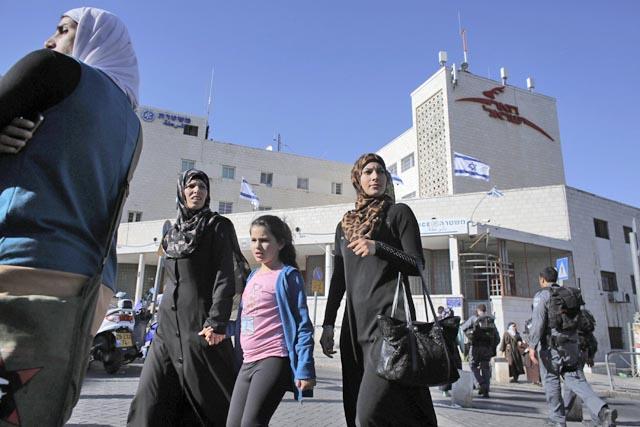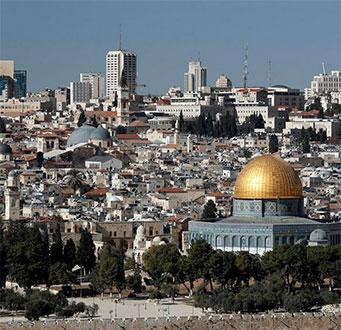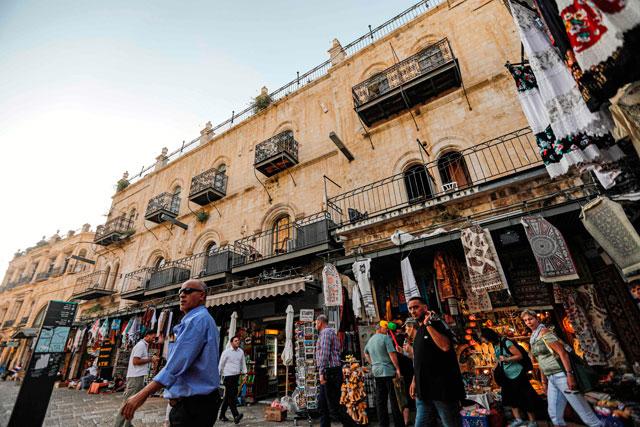You are here
Israeli settlers launch enclave in Palestinian business hub
By Reuters - May 04,2014 - Last updated at May 04,2014

OCCUPIED JERUSALEM — The smell of fresh paint wafts through the domed lobby of the latest Israeli arrival in East Jerusalem — a Jewish seminary in a bustling commercial area in the same building as a post office serving thousands of Palestinians every day.
Otzmat Yerushalayim, which includes sleeping quarters and could house as many as 300 young Israelis, is the first Jewish housing venture on Saladin Street, a main shopping thoroughfare across from the walled Old City.
Palestinians and Israeli critics worry the placement of the academy in such a central location is asking for trouble in East Jerusalem, which has stayed largely trouble-free in recent years compared to the Gaza Strip and occupied West Bank, and which Palestinians hope will be the capital of a future state.
“Tensions are sure to spike here. It isn’t going to be easy,” a Palestinian pharmacist, who gave her name only as Maral, said in a drugstore across the street.
“They will just close us up the second a confrontation arises and all work will grind to a halt,” she said.
Israel’s annexation of East Jerusalem after its occupation in a 1967 war has never been recognised, meaning most of the world views Israeli enclaves there as illegal settlements.
Settlement expansion has been a key sticking point in Israeli-Palestinian peace talks, which collapsed in April. But even when Israel froze construction temporarily in 2010, it always insisted the moratorium exclude East Jerusalem, which it views as an integral part of the country.
Unlike in the occupied territories, most Palestinians in East Jerusalem enjoy Israeli social benefits and looser travel restrictions, making them less motivated to engage in political protests.
Religious fervour runs deep in the holy city, however, and violence flared during the Jewish Passover holiday when Palestinians, gathered at a holy site revered by Muslims and Jews, threw rocks and firecrackers to try to prevent any attempt by ultranationalist Jews to pray there.
Israeli forces used stun grenades to quell the protests at a plaza that overlooks Judaism’s Western Wall and is home to Al Aqsa Mosque, Islam’s third holiest site. Jews refer to the area as the Temple Mount, the site of the two biblical Jewish temples.
Formal opening
Ateret Cohanim, the private organisation behind the seminary project, has been moving hundreds of Jewish families into predominantly Palestinian-inhabited East Jerusalem for years, either by acquiring property or laying claim to land Jews bought before Israel’s creation in 1948.
It expects a formal opening ceremony to take place at the seminary later this month as part of Israeli celebrations of the 47th anniversary of its capture of East Jerusalem.
A teacher at the school, where a rabbi’s portrait hung on freshly painted walls amid benches and bunk beds, said it quietly opened its door a few weeks ago. The seminary’s windows are painted white, shielding those inside from view from the street.
Daniel Luria, a spokesman for Ateret Cohanim, declined to comment on the seminary while accompanying Reuters on a tour of a half-dozen settlement projects the group has spearheaded in Palestinian residential neighbourhoods of East Jerusalem.
Luria said Ateret Cohanim, whose website suggests it raises more than half of its funds from donors in the United States, wanted Jews to live alongside Palestinians, not supplant them.
Some 200,000 Israelis have settled in East Jerusalem, which is home to about 280,000 Palestinians. Most live in largely separate areas.
“We’re really just doing what Zionism has always been defined as, the return of the Jewish people to the land of Israel. But we’re doing that in an area in the heart of Jerusalem,” Luria said.
Sensitive acquisitions
It is not clear how Ateret Cohanim got ahold of a section of the five-storey structure housing the post office, built at a time when neighbouring Jordan controlled East Jerusalem.
Ateret Cohanim refuses to discuss its acquisitions, citing the issue’s sensitivity. Settlement watchdog groups say an Israeli company that occupied the property put it up for sale.
The Israeli government often distances itself from the activities of pro-settler groups in East Jerusalem, generally leaving it up to the courts to decide in case of disputes.
It weighs in more on settlement in the occupied West Bank where it must authorise any enclaves before they are built — though dozens of settlement outposts have gone up without authorisation over the years. Although the government often vows to remove them, that process often takes years.
A spokeswoman at the Israel Lands Authority, the government agency that oversees land and ownership, denied any knowledge of the seminary transaction.
Luria insisted that Ateret Cohanim was not political, but also said a majority of Israelis opposed relinquishing control over any of Jerusalem for a peace deal with Palestinians.
Asked whether his group was seeking to ensure this didn’t happen, he replied: “Not that there are not ramifications behind Jews living in certain areas - we’re not stupid.”
Meir Margalit, a leader of the left-wing Meretz Party’s representatives in Israel’s Jerusalem municipality, said he had sought European and US intervention to try to block the seminary’s opening.
“It’s a sure recipe for violence. This is a very strategic site and there’s a potential here to cause serious disruptions in civic life in this city,” Margalit said.
Outside the post office building, Mohammed Tufaha, a 26-year-old Palestinian physical education teacher, sorted through a packet of letters he had just collected.
“Little by little, they are trying to overtake us. Soon they will move into other buildings as well and Judaise the entire area,” he said.
Related Articles
OCCUPIED JERUSALEM — Israel's top court has ruled that a Jewish settler group legally purchased an East Jerusalem property from the Greek Or
OCCUPIED JERUSALEM — A Palestinian family pledged on Monday to appeal an Israeli court order to evict them from their home in a Palestinian
OCCUPIED JERUSALEM — Israel's top court gave final approval for the 2004 alleged sale of properties by the Greek Orthodox Church to a Jewish

















